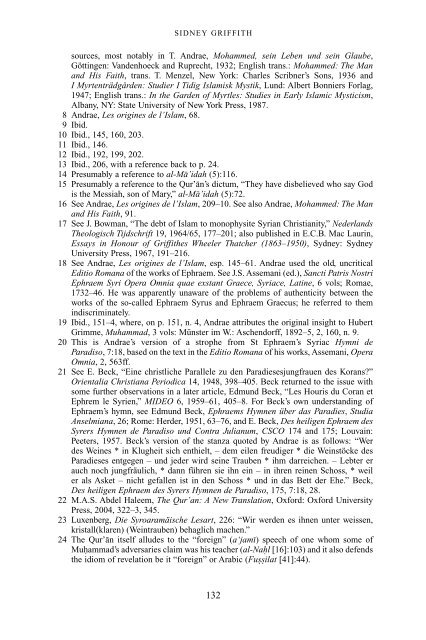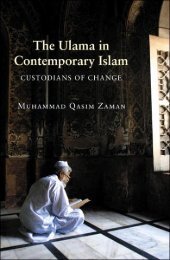The Qur'an in its historical context (pdf - Islam and Christian-Muslim ...
The Qur'an in its historical context (pdf - Islam and Christian-Muslim ...
The Qur'an in its historical context (pdf - Islam and Christian-Muslim ...
You also want an ePaper? Increase the reach of your titles
YUMPU automatically turns print PDFs into web optimized ePapers that Google loves.
SIDNEY GRIFFITH<br />
sources, most notably <strong>in</strong> T. Andrae, Mohammed, se<strong>in</strong> Leben und se<strong>in</strong> Glaube,<br />
Gött<strong>in</strong>gen: V<strong>and</strong>enhoeck <strong>and</strong> Ruprecht, 1932; English trans.: Mohammed: <strong>The</strong> Man<br />
<strong>and</strong> His Faith, trans. T. Menzel, New York: Charles Scribner’s Sons, 1936 <strong>and</strong><br />
I Myrtenträdgården: Studier I Tidig <strong>Islam</strong>isk Mystik, Lund: Albert Bonniers Forlag,<br />
1947; English trans.: In the Garden of Myrtles: Studies <strong>in</strong> Early <strong>Islam</strong>ic Mysticism,<br />
Albany, NY: State University of New York Press, 1987.<br />
8 Andrae, Les orig<strong>in</strong>es de l’<strong>Islam</strong>, 68.<br />
9 Ibid.<br />
10 Ibid., 145, 160, 203.<br />
11 Ibid., 146.<br />
12 Ibid., 192, 199, 202.<br />
13 Ibid., 206, with a reference back to p. 24.<br />
14 Presumably a reference to al-Ma’idah (5):116.<br />
15 Presumably a reference to the Qur’an’s dictum, “<strong>The</strong>y have disbelieved who say God<br />
is the Messiah, son of Mary,” al-Ma’idah (5):72.<br />
16 See Andrae, Les orig<strong>in</strong>es de l’<strong>Islam</strong>, 209–10. See also Andrae, Mohammed: <strong>The</strong> Man<br />
<strong>and</strong> His Faith, 91.<br />
17 See J. Bowman, “<strong>The</strong> debt of <strong>Islam</strong> to monophysite Syrian <strong>Christian</strong>ity,” Nederl<strong>and</strong>s<br />
<strong>The</strong>ologisch Tijdschrift 19, 1964/65, 177–201; also published <strong>in</strong> E.C.B. Mac Laur<strong>in</strong>,<br />
Essays <strong>in</strong> Honour of Griffithes Wheeler Thatcher (1863–1950), Sydney: Sydney<br />
University Press, 1967, 191–216.<br />
18 See Andrae, Les orig<strong>in</strong>es de l’<strong>Islam</strong>, esp. 145–61. Andrae used the old, uncritical<br />
Editio Romana of the works of Ephraem. See J.S. Assemani (ed.), Sancti Patris Nostri<br />
Ephraem Syri Opera Omnia quae exstant Graece, Syriace, Lat<strong>in</strong>e, 6 vols; Romae,<br />
1732–46. He was apparently unaware of the problems of authenticity between the<br />
works of the so-called Ephraem Syrus <strong>and</strong> Ephraem Graecus; he referred to them<br />
<strong>in</strong>discrim<strong>in</strong>ately.<br />
19 Ibid., 151–4, where, on p. 151, n. 4, Andrae attributes the orig<strong>in</strong>al <strong>in</strong>sight to Hubert<br />
Grimme, Muhammad, 3 vols: Münster im W.: Aschendorff, 1892–5, 2, 160, n. 9.<br />
20 This is Andrae’s version of a strophe from St Ephraem’s Syriac Hymni de<br />
Paradiso, 7:18, based on the text <strong>in</strong> the Editio Romana of his works, Assemani, Opera<br />
Omnia, 2, 563ff.<br />
21 See E. Beck, “E<strong>in</strong>e christliche Parallele zu den Paradiesesjungfrauen des Korans?”<br />
Orientalia <strong>Christian</strong>a Periodica 14, 1948, 398–405. Beck returned to the issue with<br />
some further observations <strong>in</strong> a later article, Edmund Beck, “Les Houris du Coran et<br />
Ephrem le Syrien,” MIDEO 6, 1959–61, 405–8. For Beck’s own underst<strong>and</strong><strong>in</strong>g of<br />
Ephraem’s hymn, see Edmund Beck, Ephraems Hymnen über das Paradies, Studia<br />
Anselmiana, 26; Rome: Herder, 1951, 63–76, <strong>and</strong> E. Beck, Des heiligen Ephraem des<br />
Syrers Hymnen de Paradiso und Contra Julianum, CSCO 174 <strong>and</strong> 175; Louva<strong>in</strong>:<br />
Peeters, 1957. Beck’s version of the stanza quoted by Andrae is as follows: “Wer<br />
des We<strong>in</strong>es * <strong>in</strong> Klugheit sich enthielt, – dem eilen freudiger * die We<strong>in</strong>stöcke des<br />
Paradieses entgegen – und jeder wird se<strong>in</strong>e Trauben * ihm darreichen. – Lebter er<br />
auch noch jungfräulich, * dann führen sie ihn e<strong>in</strong> – <strong>in</strong> ihren re<strong>in</strong>en Schoss, * weil<br />
er als Asket – nicht gefallen ist <strong>in</strong> den Schoss * und <strong>in</strong> das Bett der Ehe.” Beck,<br />
Des heiligen Ephraem des Syrers Hymnen de Paradiso, 175, 7:18, 28.<br />
22 M.A.S. Abdel Haleem, <strong>The</strong> Qur’an: A New Translation, Oxford: Oxford University<br />
Press, 2004, 322–3, 345.<br />
23 Luxenberg, Die Syroaramäische Lesart, 226: “Wir werden es ihnen unter weissen,<br />
kristall(klaren) (We<strong>in</strong>trauben) behaglich machen.”<br />
24 <strong>The</strong> Qur’an <strong>its</strong>elf alludes to the “foreign” (a‘jami) speech of one whom some of<br />
Muhammad’s adversaries claim was his teacher (al-Nahl [16]:103) <strong>and</strong> it also defends<br />
the idiom of revelation be it “foreign” or Arabic (Fussilat [41]:44).<br />
132



